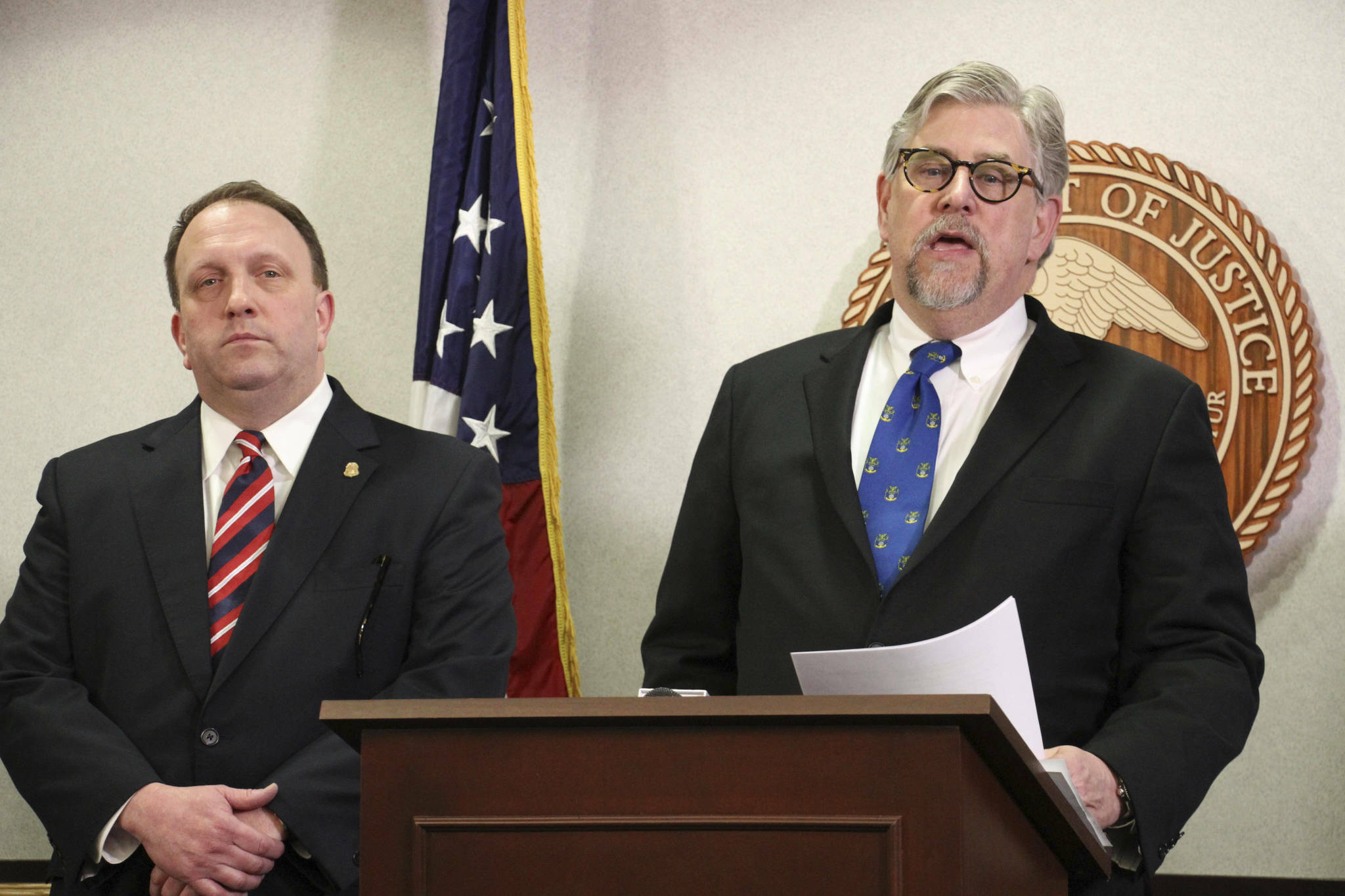ANCHORAGE — Filthy Fuhrer and five other members of a white supremacist gang that was spawned in prisons in Alaska, Arizona and Colorado have been charged in the gruesome beating death of a member whose Nazi tattoo was burned off his rib cage with a hot knife.
Fuhrer, who legally changed his name from Timothy Lobdell, and the others sporting tattoos like iron crosses, swastikas or Schultzstaffel (SS) lightning bolt tattoos also face federal racketeering charges of kidnapping and assault in the August 2017 beating death of Michael Staton, who went by the gang nickname Steak Knife. Court documents did not list attorneys for the men charged.
Two others, Nicholas Kozorra and Dustin Clowers, have previously pleaded guilty to murder charges in Staton’s death. Those plea agreements were recently unsealed.
Bryan Schroder, the U.S. attorney in Alaska, said at a news conference in Anchorage on Wednesday that 14 other members of the 1488 prison gang or its associates have been charged or already sentenced in the federal investigation for offenses like being a felon in possession of a firearm, mail theft or distributing drugs or firearms.
The gang got its start in 2010 among 50 to 100 prisoners either serving time in Alaska facilities or those shipped out-of-state to serve their sentences in Arizona or Colorado. Once members are paroled from prison, they are to report to leaders in what they call “Free Alaska.”
“Recently, the 1488s structure and influence expanded to rural and suburban areas throughout Alaska,” the court documents say.
“If you see those kind of severe tattoos on people in your neighborhood, then maybe you want to let local law enforcement know, because there might be something going on,” Schroder said.
The name of the gang, 1488, refers to different tenets of white supremacy, according to court documents. The “14” refers to the 14 words in a white nationalist creed: “We must secure the existence of our people and a future for white children.”
There are two possible meanings for the last part of the gang’s name. The 88 could reference the 88 precepts outlined by white supremacist David Lane, or they could stand for “Heil Hitler,” since H is the eighth letter of the alphabet.
They require all members to “be white, look white and act white.”
Members adorn themselves with Nazi-style tattoos, but the most coveted is awarded to so-called “made” members, who gain full membership by committing an act of violence on behalf of the gang.
The 1488 “patch” tattoo is an iron cross superimposed over a swastika, and is tattooed on the right side of the ribcage.
This was the tattoo that was burned off Staton’s body the night he died in August 2017.
According to Clowers’ plea agreement, gang members suspected Staton had been stealing drugs and a Hells Angels’ vest from Craig King, who is also charged. All the men were out of jail at this time, but Clowers was on ankle monitoring.
Staton was beaten by four men, and his hands and feet were bound with duct tape and rope.
He was delivered to a duplex in Wasilla, about 40 miles north of Anchorage. King and his wife lived on one side. The other side was vacant but prepared for the beating with walls and floor covered with painter’s plastic.
Inside, court documents say, Staton was further beaten before Clowers and two others heated the knife with a propane torch and took turns burning off Staton’s 1488 patch.
“At that point Staton was still alive but was badly beaten,” court documents say. His body was rolled in the carpet and the plastic, and put in the back of a vehicle and driven off.
The gang gets its money from the illegal trafficking of drugs and firearms, and members used violence including murder, assault and obstruction of justice to protect and enhance their power, officials said.
One of its goals was to enlist new members, recruited both inside prisons and outside. New recruits had to be sponsored by an existing member, but they would not accept someone for their sheer hustle, money or friendship.
“Instead, they claimed that only ‘violence and unquestionable loyalty’ could earn a patch,” court documents say.
A recruit was observed for at least 14 months before the membership cast a final vote. The vote had to be unanimous for a man to become a member.
The gang didn’t accept gay members, “rats” or people who had been charged with sex offenses, the documents say.
Women are not allowed membership in the 1488. But they can be associates, and could be expected to smuggle drugs into imprisoned members.
Alaska had inmates in Arizona and Colorado prior to 2013, said Sylvan Robb with the Department of Corrections.
Alaska Gov. Mike Dunleavy, as part of his budget, proposed sending at least 500 inmates to out-of-state prisons as a potential way to save money. A House subcommittee recently rejected the idea, with House Finance Committee Co-chair Tammie Wilson saying the administration provided little information for how that would work.
• By MARK THIESSEN, Associated Press


